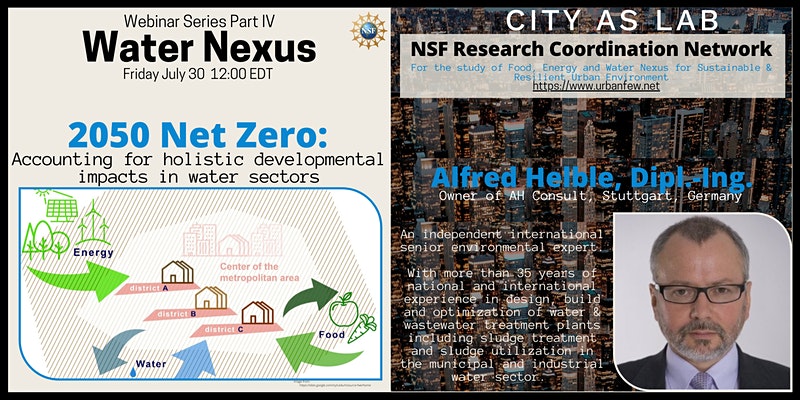
2050 Net Zero: Accounting for holistic developmental impacts in water sectors
By: Alfred Helble, Dipl.-Ing. Owner of AH Consult, Stuttgart, Germany
The future water demand will increase with the aim of a more intensive use of integrated and urban areas for food production as well as the implementation of a green urban infrastructure especially in cities against increasing temperature and heat islands. In contrast, it is becoming apparent that due to climate change and falling groundwater levels, the water supply is reaching its limits.
Bases of a sustainable concept development is a cross-sectoral consideration of material cycles with the aim of food, water and energy supply and to ensure healthy, socially balanced and economically productive communities. In the water sector, the reuse of purified wastewater from wastewater treatment plants, which is available in a calculable quantity and quality during the whole year, needs to be integrated as a vital resource.
In an efficient waste / circular economy, all potentials must be tapped from a consistent collection of biogenic waste and residues. The renewable energy source biogas is generated in wastewater treatment plants and with increasing capacity from efficient digestion of food waste from a systematic collection of bio-waste in a further developed future circular economy. Utilisation, transformation and integration of biogas to the green hydrogen and future fuel strategies results in a direct link to renewable energies. Understanding and implementing the coupling potential within the sectors represent an essential part towards the 2050 Net Zero Carbon Emission objective. Results of case studies of integrated concepts are presented.
Ing. Helble is a delivery independent international senior environmental expert with more than 35 years of national and international experience in design and build and optimization of water and wastewater treatment plants including sludge treatment and sludge utilization in the municipal and industrial water sector.
His experience includes numerous concept studies and large-scale applications with a wide range of treatment technologies, risk analyses, monitoring and data evaluation, approvals and performance tests studies for implementation of new technology as well as for the assessment of environmental emission data compared to BAT rules in order to meet national and international legal requirements. His current focus is on application of advanced treatment elimination of micro pollutants, treated effluent reuse, sludge and biogas utilization for future fuels.
Inscriptions ici
